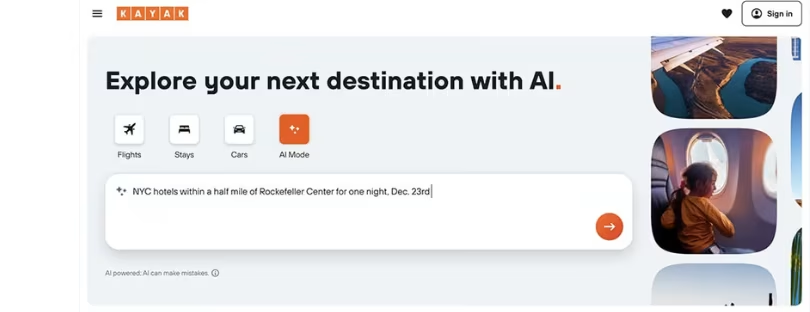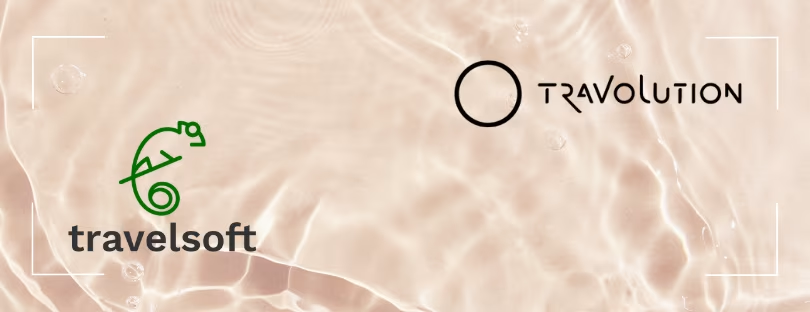
Talk. Book. Go. Inside Sabre’s AI-Powered Future of Travel Commerce
Artificial intelligence isn’t just the latest buzzword in travel — it’s becoming the engine that powers how we search, plan, and even dream about our next trip. Once quietly running in the background, AI now shapes everything from our playlists to our purchase decisions. And in travel, it’s finally stepping into the spotlight — not as a gimmick, but as the next major leap in how journeys are inspired, personalized, and booked. conversational AI in travel
Sabre’s new whitepaper, Chat As the New Influencer: From Conversations to Clicks, makes that message clear: conversational commerce — fueled by agentic AI — is about to redefine the traveler experience from start to finish.
From Social Commerce to Conversational Commerce
Commerce always follows attention. And attention is rapidly shifting from social feeds to generative AI-powered chat platforms. We’ve seen this before: during the pandemic, social commerce transformed fashion, beauty, and retail by turning “likes” into sales.
But travel isn’t a sweater or a skincare kit. It’s complex, high-value, and deeply personal. Flights, hotels, transfers, visas, and family schedules don’t fit neatly into an “add to cart” button. While Instagram and TikTok built the world’s wanderlust machine, they couldn’t close the loop between inspiration and booking.
That’s where conversational AI comes in. Instead of browsing endless tabs or juggling apps, travelers can simply talk to an AI — “Plan me a four-day escape to Lisbon with boutique stays, seafood, and a day trip to Sintra.” In seconds, the system delivers curated options, real-time availability, and prices across platforms.
Sabre’s whitepaper positions this as the natural next step: social commerce inspires, but conversational commerce converts.
Why Conversational Commerce Changes Everything
The leap from intent to action has always been the missing link in travel marketing. According to Skift’s State of Travel 2025, around 60% of travelers say they’re open to booking through social channels — yet fewer than 10% actually do. Trust, complexity, and fragmentation have kept conversion rates painfully low.
Conversational AI changes that equation. It merges discovery, personalization, and transaction in one continuous flow. As Jen Catto, Chief Marketing Officer at Sabre, puts it:
“Conversational commerce isn’t a tech trend; it’s a generational leap. It collapses the distance between desire and delivery, turning complexity into conversion — and every traveler into their own influencer.”
It’s not just about convenience — it’s about immediacy. Psychology tells us that anticipation is the strongest driver of reward, and AI taps directly into that impulse. The moment a traveler expresses intent, AI delivers the reward: a personalized plan ready to book.
From Generative to Agentic AI: A Game-Changer for Travel
If generative AI helps travelers plan, agentic AI helps them act. The distinction is subtle but powerful. Agentic AI doesn’t just suggest — it executes. It can book, rebook, modify itineraries, and adapt in real time.
According to McKinsey’s 2025 Travel Report, 59% of travel executives say AI has increased operational productivity, while over one-third claim it’s already improving personalization quality.
Sabre is at the forefront of this evolution. Its SabreMosaic™ platform uses Google’s Vertex AI and Gemini frameworks, underpinned by Sabre’s Travel Data Cloud. Its IQ AI Layer personalizes traveler interactions at scale, while the IQ Assurance Layer ensures transparency, compliance, and explainability — addressing one of the biggest concerns in today’s AI-driven environment: trust.
Amadeus is moving in a similar direction with its Traveler DNA project, aiming to build predictive traveler profiles across airlines and OTAs. Expedia Group has integrated OpenAI models directly into its app, while Google’s Gemini continues to merge conversational AI with travel discovery through Google Travel.
The race is on — not to build the flashiest chatbot, but to own the conversation.
Turning Complexity Into Conversion
Travel, by nature, is complicated. But that complexity is also what makes it so ripe for AI disruption. Multi-leg itineraries, family trips, or corporate travel — once logistical nightmares — can now be solved through a single prompt.
“Find me a four-star hotel in Paris with early check-in, EV parking, and rooms under €250.”
No filters. No drop-down menus. Just human language — and instant results.
Sabre calls this “collapsing complexity into conversation.” By eliminating the friction of search forms and comparison sites, AI transforms how we interact with travel content. Each traveler becomes both the curator and the consumer — the influencer and the buyer — in a single digital dialogue.
Democratizing Discovery
Beyond personalization, conversational AI is also democratizing discovery. Smaller hotels, boutique stays, and niche destinations that rarely appear on page one of Google now have a fair chance to surface — if they align with a traveler’s expressed preferences.
This isn’t just shifting demand; it’s creating it. Sabre’s internal data suggests that more than half of travelers using conversational AI discover destinations or experiences they wouldn’t have found otherwise. That’s a new kind of growth — one based on demand creation, not redistribution.
Building the Next Trust Economy
But with great automation comes great accountability. Trust is emerging as the new currency in travel AI. Transparent pricing, explainable recommendations, and responsible data use will separate the leaders from the laggards.
As regulatory frameworks like the EU AI Act tighten, travel companies that can prove data integrity and governance will have a critical edge. Sabre’s emphasis on its Assurance Layer signals a proactive approach to this reality — one the industry can’t afford to ignore.
What Travel Brands Should Do Now
The message from Sabre, Phocuswright, and Deloitte is consistent: waiting is not an option. AI adoption is accelerating, and the earlier travel brands experiment, the faster they’ll learn.
Here’s what travel companies should focus on:
- Be first movers: Early integration of agentic AI creates a lasting competitive moat.
- Redefine the storefront: The next booking might happen via WhatsApp, a voice assistant, or a brand’s own AI agent — not a website.
- Invest in trust: Compliance, transparency, and explainability will define credibility.
- Co-create experiences: AI should empower, not dictate. Travelers must feel in control of personalization.
As Sabre’s Garry Wiseman notes,
“We’re building the platforms to turn conversations into commerce — and commerce into loyalty.”
The Bigger Picture: Who Will Own the Conversation?
The travel industry’s complexity once made it resistant to digital revolutions. Ironically, that same complexity now gives it an edge. AI thrives on rich, structured data—and travel has more of it than almost any other sector.
The new race isn’t between OTAs and GDSs. It’s between ecosystems:
- Sabre, Amadeus, and Travelport want to control the infrastructure layer.
- Google, OpenAI, and Perplexity dominate discovery.
- Expedia, Booking, and Hopper focus on experience and loyalty.
Whoever integrates these worlds best — discovery, trust, and transaction — will own the traveler relationship for the next decade.
Conclusion: The AI Moment Isn’t Coming — It’s Already Here
We’ve seen hype cycles before — web 2.0, mobile apps, social commerce. But this one feels different. Generative and agentic AI aren’t trends; they’re infrastructure.
Sabre’s latest whitepaper shows just how quickly the paradigm is shifting from “search and book” to “ask and go.” The winners of this race won’t be the biggest players, but the smartest — those who blend automation with authenticity, speed with security, and personalization with transparency.
As Skift recently put it, “Conversation is the new conversion.”
Travel brands that fail to adapt risk fading into irrelevance in a world where the first interaction isn’t a search box or a banner ad — it’s a chat.
And in that world, the voice that answers back may very well be powered by Sabre.








